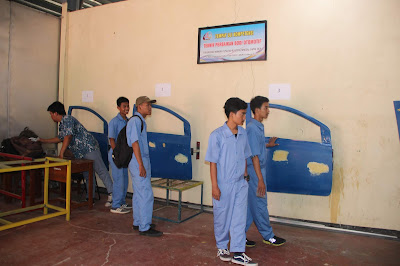When
sinking looms, jump.
Imagine if almost six per cent of the Coalition reckoned
they’d lose their seats at the next election so switch to Labor.
Chances are they wouldn’t be piped aboard, as ship
jumpers are not favoured in Australian politics, distrusted by the party they
betrayed and the one where they seek to stowaway.
Not so in Indonesia where more than 30 in the 560-member
House of Representatives (DPR) have sniffed the wind and reckon they’d rather
jettison principles than lose prestige.
That’s according to Jakarta think-tank the Centre for Strategic and
International Studies.
Parties need at least four percent of the national vote
to stay afloat in the DPR so members of small shows, often faith-based, have
been checking lockers for lifejackets.
Why so keen to hang-in? Politicians everywhere say they’re
motivated by wanting to ‘serve the community’. The truer phrase in Indonesia
would be ‘take from the community.’
Transparency International claims the law makers work in the Republic’s
most corrupt public institution.
In the last 15 years the Corruption Eradication Commission
(KPK) has secured convictions against almost 550 public servants and
politicians. It remains the most trusted public authority so subject to attacks
by its victims for being ’too powerful’.
Seventeen is a mystic number in Indonesian culture; 17
August 1945 was the date the nation declared its independence from the colonial
Dutch, so it was appropriate that the first of five national TV debates ahead
of the 17 April national vote was held on 17 January.
This pitted President Joko Widodo, 57, and his running mate
hardline Islamic cleric Ma’ruf Amin, 75, against Prabowo Subianto, 67, and
US-educated businessman Sandiaga Uno, 49.
Widodo, who has held power
for the past five years, heads a coalition of seven parties, led by the
Indonesian Democratic Party of Struggle (PDIP). Together they hold 386
seats. Election of the President is by
direct popular vote and doesn’t depend on numbers in the DPR.
With three months before
the ballot, the incumbent is leading most opinion polls. But in this vast and complex nation
straddling the Equator, one spark from an inflammatory issue (price of basic
commodities, overseas ‘interference’ or religious slur) could start a bushfire
turning predictions to ash.
Opposition is the Red and White Coalition (named after the
bicolour national flag), with 113 seats.
It’s just two parties led by Gerindra started by Subianto as a vehicle
for his bid to remain relevant.
He’s a yesteryear’s warrior hoping to remove Widodo in a
contest that deserves close attention, particularly by Australians concerned
our foreign policy should be more Jakarta and less Washington
Billed as big, a splendid example of doing politics properly
in the world’s third largest democracy, the debate disappointed largely because
it wasn’t. That’s because the General
Election Commission (KPU) determined the issues – law, human rights, terrorism
and conflict – and gave questions in advance.
Predictably answers were memorised ensuring speakers drove
past each other staring ahead; they seldom crossed the median strip threatening
a collision of policies which might spark chatter.
Post-event interviews of viewers found many rated the show
boring, failing to offer new initiatives to handle old problems. Some said they dozed off.
Subianto revealed his sclerotic
thinking by continually urging ‘strong’ boundaries, laws and responses to
crises, wrapping himself in knots (and nots) when Widodo asked about the
endorsement of six candidates who’d already been convicted of corruption.
Suggesting it’s up to the
electorate to reject them, wasn’t the best response from a man with the power
to sift applicants.
For Western viewers Uno appeared
the most professional, attacking Widodo on his record and asking why voters
should continue trusting his government.
This should have given the President the chance to launch a job-done
list. He blew it.
The challenger’s backers remind voters their hero is
properly titled Lieutenant General (retired).
They think electors still hanker for a return to the tough-guy politics
which kept Subianto’s former father-in-law Soeharto in power for 32 years last
century.
Indonesia’s median age is 30 (Australia’s is 37); the
world’s most populous Muslim nation (88 per cent of 260 million), is largely
young. Around 30 per cent were born
since Soeharto quit in 1998 after student riots against his economic and
conservative social policies, so talk of the Good-ol’-Days means nothing unless
it’s a game or smartphone app.
Although a grandfather, calm low-key Widodo looks young,
cool and modern, unlike the arrogant Subianto, often astride a horse and
wearing dark glasses. His style is fascist aloof.
Subianto told viewers that raising public officials’ salaries
would hasten the defeat of corruption.
However most convicted of bribery were holding top jobs with good pay
when arrested.
Former Golkar Party leader Setya Novanto, once a super-rich
wheeler, is now serving a 15-year term involving a AUD $240 million electronic
ID card fraud. The lower rungs tend to have higher morals.
Widodo’s offsider Amin is a former head of the world’s
largest Sunni Islamic organisation Nahdlatul Ulama claiming 40 million members. He’s more used to addressing
compliant congregations so put in a poor performance, even failing to find
anything to say when offered time to summarise.
Why bother to persuade when you can order? Indonesia’s Human Rights watch has reminded
voters that Amin has ‘helped draft and been a vocal supporter of fatwas (religious
edicts),
‘Those fatwas, although not legally binding, have
been used to legitimise increasingly hateful rhetoric against LGBT people and
in some cases, fuelled deadly violence by militant Islamists against religious
minorities.’
Sadly these issues stir few voters; the candidates know this
well so just give tick-a-box replies on HR and move on to other concerns – food
security, energy and natural resources.
All on the agenda for debate two next month. On the 17th, of
course.
Australian journalist Duncan Graham lives in East Java.
##
http://johnmenadue.com/duncan-graham-when-sinking-looms-jump/






